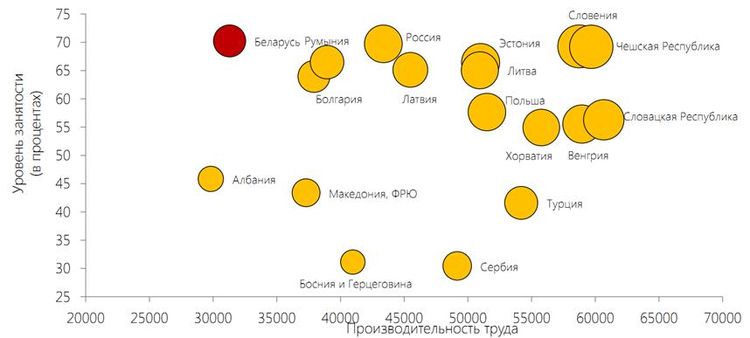The National Bank: Wage Increase Jeopardizes The National Security Of Belarus
- 11.10.2016, 16:47
- 3,004

"Researchers" of the National Bank came to interesting conclusions.
Belarus has a very high employment rate and a very low output per worker. At the same time the ruler did not like that there were no proposals of the IMF towards "salary increase."
Recently, the head of state has criticized the IMF requirements noting that "when you read their requirements it all comes down to one (if we talk about the social sphere): no increase in salary, the immediate increase of tariffs and other". At the same time, a recent study of the National Bank notes that "the increase in wages without structural reforms can increase the likelihood of new crises and aggravate the national security threat", Economika. by writes.
Researchers from the National Bank divided the growth potential into factors: labour, capital and "total factor productivity" (TFP). They tried to figure out which of these factors the most negatively effects the Belarusian economy, ej . By reports.
It is found that this is "total factor productivity". Its contribution to the economy declined from 6.1% in 2003-2009 to minus 1.5% in 2014-2015.
"Reduction and negative contribution of the TFP point respectively to decline in efficiency and non-optimal use of capital and labour resources in the economy," authors of the study from the National Bank noted.
The results obtained by experts of the National Bank in general comply with the results of the IMF's research voiced a year ago during Kastrychnitski forum by head of the permanent IMF representative for Central and Eastern Europe B. Bakker. He noted that with almost the highest level of employment output per worker in Belarus is almost the lowest in the region. In fact, in Belarus two employees produce the same amount of goods like one employee in any country of the Visegrad Group and the Baltic States.

At the same time, "observed growth of welfare of citizens" was not deserved, and "was ensured by detriment of the efficiency of the economy. Continuation of the trend is very dangerous because it may cause the loss of competitiveness, strengthening of internal and external imbalances, which ultimately only increase the likelihood of new crises and recession in living standards, strengthen national security threat," researchers of the National Bank say.
Only "positive contribution of the TFP can serve as a partial justification for the increase in real wages." In turn, "the TFP increase is possible only amid sooner implementation of measures aimed at strengthening of market mechanisms of redistribution of financial, human and material resources from less efficient to more efficient sectors and organizations."
The highest priority, according to the National Bank's researchers, belongs to "the elimination of price distortions through price liberalization, the abolition of cross-subsidization and cessation of directed lending" . Another priority is the "reform of state enterprises, the launch of bankruptcy procedures of inefficient institutions, the release of excessive employment in public enterprises and creation of new jobs in a private sector." These measures "should guarantee an unconditional increase in capital productivity, sustainable growth to labour and labour productivity, which is impossible without a more efficient use of all factors of production."
Almost the same recommendations are specified in the September report of the IMF. It is not about absence of wage increase, but the fact that it should not be done without the increase in the TFP. And it is possible only by carrying out structural and institutional reforms.









